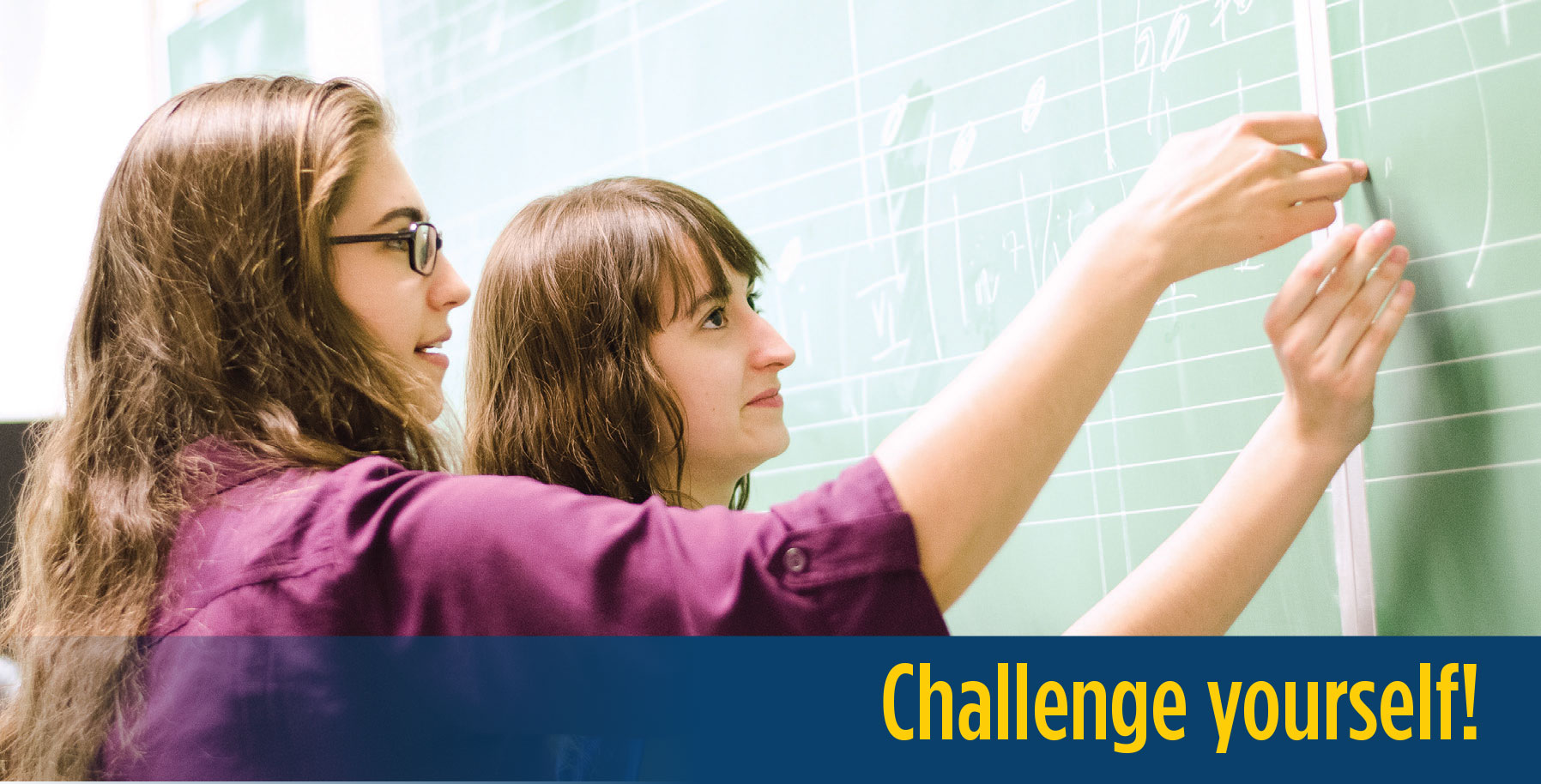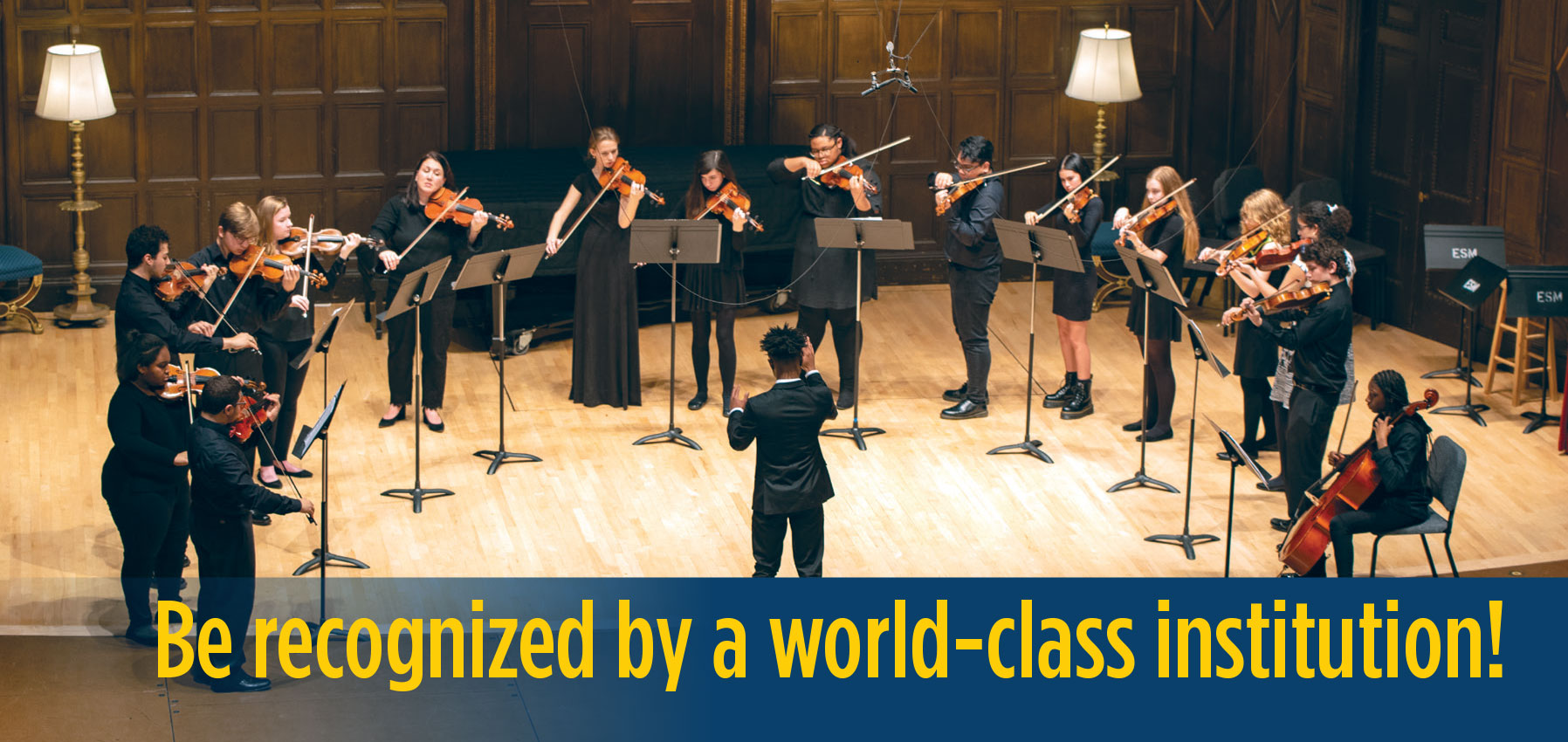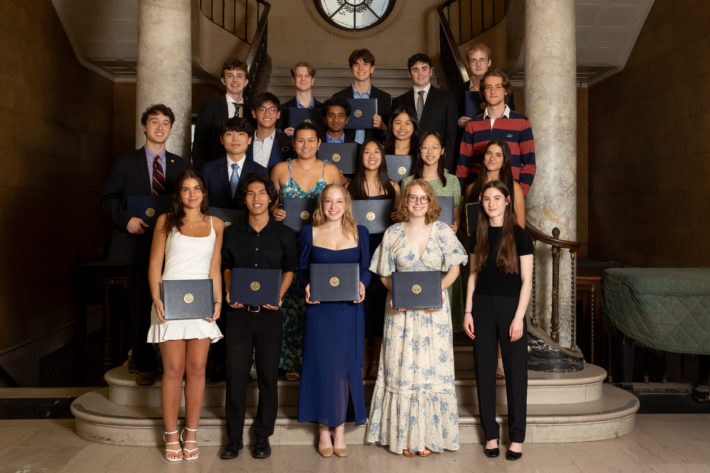
What is an ECMS Diploma?
The Eastman Community Music School’s Diploma Program represents a comprehensive musical training, encompassing a well-balanced blend of individual and ensemble instruction, performance, and academic coursework. The program allows for individualized flexibility while maintaining a rigorous standard of excellence. Students are required to fulfill requirements in the following areas:
- Individual lessons
- Exams, juries and performances
- Academic coursework
- Ensembles
High school and adult students are eligible for the Diploma and the same rules/requirements apply for each group.
Why Enroll in a Diploma Program?
- Become a better musician.
- Expand and deepen your understanding of music
- Challenge yourself
- Strengthen your college application
- Prepare for a career in music
- Gain the satisfaction of achieving recognition from one of the world’s great music schools
Diploma Options
Depending on the number of years of study at ECMS and the amount of classes completed, students can earn:
- Diploma
- Advanced Diploma
- Pre-Collegiate Diploma
| Diploma | Advanced Diploma | Pre-Collegiate Diploma | |
| Private lessons | 2 years | 3 years | 4 years |
| Examinations and Juries | annually | annually | annually |
| Performances | one per semester | one per semester | one per semester |
| Music Theory | 2 classes | 3 classes | 4 classes |
| Music History | 1 class | 1 class | 1 class |
| Keyboard Proficiency | required | required | required |
| Ensemble participation | 1 year | 2 years | 3 years |
How to Enroll in the Diploma Program
Students who are interested in pursuing an ECMS Diploma can click here to register as a candidate. Students and parents may also contact the Diploma Coordinator by phone: 274-1400 or by email: community@esm.rochester.edu with any relevant questions.
Tracking Diploma Progress
- Students can contact the ECMS Office for updates on their Diploma progress at community@esm.rochester.edu.
- Students will receive advising emails from the Diploma Coordinator at the end of their Junior Year and mid-way through their Senior Year.
- High school students can receive the Diploma only in their senior year (or the year declared as their final year of high school equivalent).
- Diplomas and Certificates are presented in person at the annual Commencement and Awards Ceremony.
Other Recognition for Academic and Performance Achievement
- Instrument-specific Diploma: Awarded to students who satisfy all Diploma requirements and achieve curricular level 5 in a jury.
- Diplomas with Honors: Students who satisfy all Diploma requirements and achieve curricular level 6 by their junior year are eligible to perform an Honors Jury. If the Honors Jury is passed the student can then receive a Diploma with Honors. This is the highest distinction that ECMS awards. For complete information on the Diploma with Honors click here.
- Certificate of Advanced Achievement in Performance: is awarded to all students who achieve level 6 in a jury. Enrollment in and completion of the Diploma Program is not required to receive this Certificate.
- Certificate of Advanced Achievement in Music Theory: is awarded to students not enrolled in the Diploma Program who complete at least 4 years of theory coursework with straight A grades (at least one year has to include an Advanced Theory class).

Lesson Requirements
- Only lessons attended at ECMS and taught by our faculty can be applied toward a diploma.
- Summer lessons are voluntary and do not count toward the fulfillment of lesson requirements.
- While they are an enriching experience, the Summer Classical Studies and Summer Jazz Studies programs do not count toward fulfillment of any Diploma requirements.
- Lessons must be taken each year through the senior year of high school in order to receive the diploma. For adult students, lessons must be taken in the year when the diploma is to be awarded.
Music Theory Requirements
Music Theory classes that qualify for the diploma requirement are:
- Fundamental Musicianship (recommended grades 7-10):
- Theory and Aural Skills 1
- Theory and Aural Skills 2
- AP Theory (counts as two classes; high school students only)
- Intermediate Musicianship (recommended grades 8-12):
- Theory and Aural Skills 3
- Jazz Theory 1
- Jazz Theory 2
- Advanced Musicianship (grades 8-12):
- Theory and Aural Skills 4
- Counterpoint
- Keyboard Theory
Students might be able to test out of theory classes and start at the higher level. Classes they tested out can not be counted as theory fulfillment for the diploma.
Keyboard Proficiency Requirements
Diploma candidates who are non-keyboard majors may complete the requirement by one of three means:
- Complete a year of Diploma Piano Class at ECMS, or
- Complete a year of private piano lessons at ECMS, culminating in an examination where you must achieve at least a level 1, or
- Before grade 12 in high school, pass a Piano Proficiency Examination given by the ECMS Piano Department Chairperson. This examination must demonstrate basic keyboard competency.
Candidates will be asked to play:
- 2-octave scales in at least 4 major and 4 minor keys, hands separately, plus chord progressions I – IV – I – V – I in the same keys
- 3 pieces of varying styles (memorization not required), of the level of difficulty of The Notebook of Anna Magdalena Bach, Bartók Mikrokosmos, Volume 2, easier etudes of Czerny, or children’s pieces by Kabalevsky, Norton, Schumann
- a short sight-reading example, using both hands and both clefs.
Jazz Diploma candidates who are not pianists may complete the jazz keyboard requirement by one of three means:
- Complete a year of Diploma Jazz Piano Class at ECMS, or
- Complete a year of private jazz piano lessons at ECMS, culminating in an examination, or
- Before grade 12 in high school, pass an examination with an ECMS Jazz Piano Instructor.
The following skills will be examined:
Scales
- MAJOR SCALE PROFICIENCY in the most common jazz keys, played by right hand, up and down two octaves, with proper fingering: C, G, A, E, A-flat, E-flat, B-flat and F.
- THREE MINOR SCALES: melodic minor, natural minor and harmonic minor.
- MINOR SCALE PROFICIENCY in the most common jazz keys, (played by right hand, up and down, scale degrees 1 through 5): A, B, C, D , E, F and G minor.
- BLUES SCALE PROFICIENCY in the most common jazz keys played by right hand, up and down two octaves, student’s own fingering: C, G, A, E, A-flat, E-flat, B-flat and F.
- WHOLE-HALF SCALE (played by right hand, one octave) and when to use it (i.e., played over diminished harmonies or Dom 7 flat-9 harmonies).
Jazz Theory / etudes / exercises;
- Student should be fluent in playing through the CIRCLE OF FIFTHS (roots, thirds and sevenths): ii-V-Is;
- Student should be fluent in combining the three main chord types (minor 7s, Dom 7s, Major 7s), by learning SUGAR PLUM (8-bar harmonic exercise by Bill Evans, combines all 3 elements, through all 12 keys).
Jazz Playing
- BLUES TUNE, such as “The C Jam Blues” (Duke Ellington) in C, or other, based on Blues changes, e.g.: “Now’s The Time” (Charlie Parker) in F; “Buzzy” (Charlie Parker) in B-flat; “Blue Monk” (Thelonious Monk) in B-flat; “Sonnymoon For Two” (Sonny Rollins) in B-flat; etc.
- RHYTHM CHANGE TUNE, such as “I Got Rhythm” (Gershwin) in B-flat; or another melody based on Rhythm changes, e.g.: “Cottontail” (Ellington) in A-flat; “Oleo” (Rollins) in B-flat; “Moose the Mooche” (Parker) in B-flat; “Rhythm-a-Ning” (Monk) in B-flat; “Wail” (Bud Powell) in E-flat; “Flinstones theme” (Hanna-Barbera) in B-flat; etc.
- MODAL TUNES, student chooses to play one or both: “Peace Piece” (Bill Evans) in C; “So What” (Miles Davis) in D Dorian (Dmin13)
Ensemble Requirements
- ECMS offers a wide variety of ensemble options. In order to receive a credit for ensemble you need to participate in an ECMS ensemble on the voice/instrument you are studying in individual lessons at the ECMS.
- For a complete listing of eligible ensembles and chamber music opportunities please consult our course catalog.
- Although we support and value our students participation in school and various youth ensembles, they cannot be used as a substitute for the ensemble requirement. Only ECMS offered ensembles will qualify for the Diploma requirement.
- If students are applying for the Instrument-Specific Diploma, they need to participate in the ensembles on the instrument for which they expect to receive the Diploma.
Electives
All students are encouraged to enrich and widen their horizons by taking non-required elective classes and ensembles. Theory and Aural Skills 1 is a pre-requisite class for following classes:
- Conducting
- Composition: Film Scoring
- Composition: Computer Music
- Composition: Orchestration

The Honors Diploma
All of our performance diplomas may be awarded with honors, however only the Pre-Collegiate Diploma in Theory may be awarded with honors.
The Diploma with Honors in Instrument/Voice will be awarded to students who:
- Successfully performed a level 6 jury by the end of the 2nd semester of the student’s junior year.
- Are recommended for Honors by their primary teacher.
- Submit their program to the department chair for approval by November 15.
- Perform and pass the Honors Jury judged by a panel of interdepartmental faculty in January.
- Successfully perform a solo Honors Recital (minimum 30-minute performance), near the end of the graduation year.
The Diploma with Honors in Theory will be awarded to students who:
- Qualify for the Pre-Collegiate Diploma in Theory.
- Receive the grade of A in all theory courses pertaining to the Pre-Collegiate Diploma in Theory.
- Successfully complete the Honors Theory Project in their senior year. A draft of a paper should be submitted to the jurors at least two weeks before the jury presentation to give the jurors a chance to read it.
- Be recommended for honors by their Honors Theory Project instructor.
- Receive a vote of approval by an interdepartmental faculty jury attending a lecture-recital (30 minutes) based on the student’s Honors Theory Project.
- Present the public lecture-recital near the end of the student’s graduation year.
Honors Jury Procedures
- For the sake of fairness, there will be only one Honors Jury per year. It will occur the first or second Saturday in January.
- Orchestral excerpts are not accepted.
- Jazz candidates can be accompanied by up to an additional trio.
- The Honors Jury is not a competition. It is a means to measure the artistic achievement of each student. All students may pass, some students may pass or no students may pass.
- Only the candidate, the accompanist, and a page-turner (if absolutely necessary) are allowed on stage. It has been recommended to the candidate that neither the accompanist nor the page-turner be the candidate’s teacher.
- Faculty members who have students performing may attend their student jury, but may not vote for any of the students.
- The same jury members will listen to all candidates. The jury will made up of SLC members only (no other faculty will be invited).
- Candidates are to be judged according to this performance, and not on the basis of potential or other performances.
- No audio or video recordings are permitted, and no parents are allowed into the hall.
- Students and their teachers will receive jury comments as with regular juries.
Honors Jury Program Requirements
- Honors candidates must have their 20-minute programs approved by their department chairperson. Programs should be submitted to the department chair for approval by November 15 so as to be able to change pieces prior to the jury, if required.
- The program must be stylistically and technically balanced and varied (approved by the Department Chair).
- The jazz honors jury will consist only of jazz music (all 20 minutes).
- Any “cuts” in the program to fit the timing limits, must be approved by the chair. Please submit original timings and an approximation of timing with cuts.
- The Department Chair will submit the final program to the ECMS office 10-days before the jury.
Honors Jury Performance Requirements
- The Honors Jury is a 20-minute, uninterrupted, formal recital.
- If the program goes over 20 minutes (which is perfectly fine), the school director will cut off the performance.
- Programs must be performed in the order approved by the Department Chair and printed in the program.
- Judges may disqualify any student who does not meet memorization requirements:
- Voice and piano applicants must memorize all music;
- WBP must memorize at least 5 minutes of the 20 minute performance;
- Jazz applicants must have at least half of the performance memorized;
- String applicants must memorize all concertos and unaccompanied pieces.
- Music should be performed as written – if the piece has piano accompaniment, it should be played with piano.
Honors Jury Decision Process
The judges will vote at the end of the jury. This will be a blind ballot with no discussion. A two-thirds majority is needed to pass. Judges decision is final and there will be no appea
Beginning in Fall 2024 ECMS Music Theory and Aural Skills classes, at their various levels, have been combined into one class with different sections. Students who have already taken Music Theory and Aural Skills classes separately, those already completed classes before Fall 2024 will still count for individual credits. Moving forward, starting September 9th, 2024, Music Theory and Aural Skills classes will count for 1 diploma credit.
View a downloadable version of our Diploma Brochure and requirements here.

